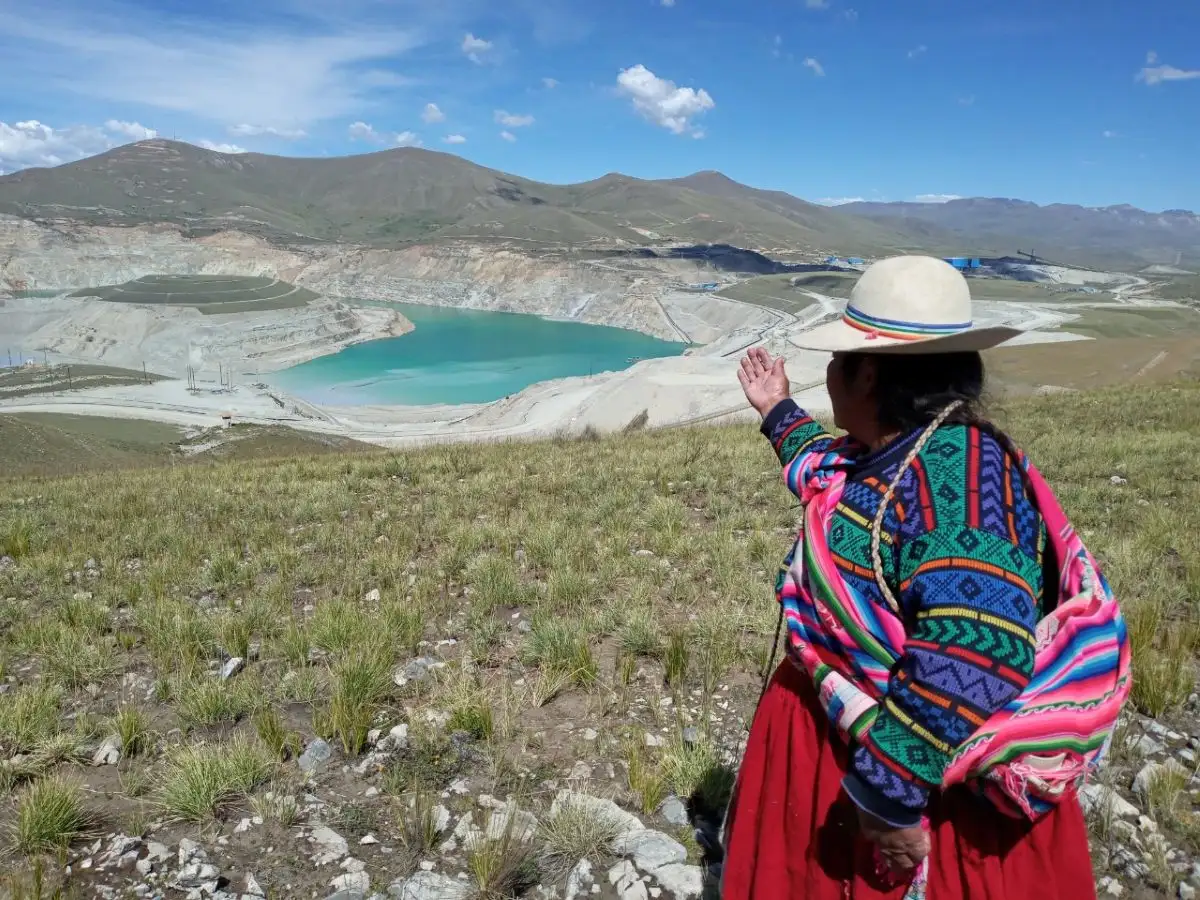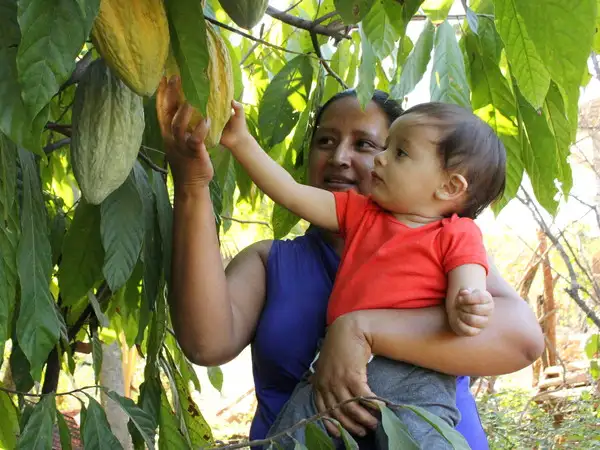

CAFOD is supporting Indigenous and small-scale farming communities in southern Peru and the highlands affected by extractive industries and the climate crisis, to defend their human rights and our common home
Peru is a country of striking contrasts, rich cultural heritage and ecological diversity. But the country faces urgent challenges: from the impacts of the climate crisis and environmental degradation to deep social inequality and fragile institutions.
Nearly 10 million people in Peru live in poverty, with Indigenous and rural communities facing persistent discrimination, exclusion and a lack of opportunities. Many people migrate to cities, settling in areas where access to safe water, basic services and secure housing is limited – making them especially vulnerable to natural disasters.
Water contamination and scarcity is a critical issue, affecting access to safe drinking water. The climate crisis is making water shortages even worse by reducing glacier-fed water sources and disrupting rainfall patterns, as well as increasing the risk of flooding.
Peru’s economy strongly depends on mining, but conflicts arise because affected communities are not meaningfully consulted about mining projects, only some benefit from the economic gains of mining, water becomes contaminated or becomes scarce in mining locations, and local Indigenous and rural communities who live near mining projects often suffer from negative impacts on their health, access to food and basic rights’ protection.
Women, girls and Indigenous groups experience high levels of gender-based violence, as well as limited educational and economic opportunities, and are frequently excluded from decisions that affect their lives. They also suffer from discrimination, criminalisation, land dispossession, and negative impacts on their mental and physical health in mining contexts.
Across Peru, Indigenous, rural and women leaders are defending their rights, land and environment in the face of growing pressures. But weak governance, political instability and new restrictions on civil society are making it harder for communities and human rights defenders to speak out safely.
A better world needs all of us. That’s why CAFOD has been working alongside local organisations, Church partners and communities in Peru since 1968, supporting those most affected by poverty, exclusion and injustice. Rooted in the Church’s call to care for our common home, together, we’ve been supporting communities to defend their human rights, tackle environmental concerns and achieve fair access and control of natural resources, because all of us deserve the opportunity to flourish.
Our impact in 2024
In 2024 we reached more than 8,195 people in Peru.
140 women and their families in areas near Lima improved their access to food, using safer, energy-efficient community kitchens, growing healthy, environmentally friendly food in family gardens, and raising small animals.
2,417 children and 1,269 parents, teachers and community leaders are safer, more resilient and have better access to basic services, as well as a healthy environment, reducing socio-environmental risks and the worst impacts of the climate crisis in communities near Lima.
209 Indigenous women from the Peruvian Amazon strengthened their leadership skills and are speaking out to defend human rights, preventing violence against women and children, and protecting their environment.
Over the last three years, we worked alongside 3,343 people from Indigenous and campesino communities in 10 regions impacted by mining. We helped amplify community voices as human rights defenders, environmental protectors and community leaders.
Why CAFOD works in Peru
Peru is one of the most unequal countries in Latin America, with around 9.8 million people living in poverty. Indigenous and rural communities face high levels of exclusion and discrimination, pushing many to migrate to cities where they often live in precarious housing with limited access to water, services and livelihoods—leaving them highly vulnerable to disasters such as floods, landslides and earthquakes.
The climate crisis is worsening water scarcity and threatening agriculture and daily life for millions, including in the densely populated coast and capital of Lima, as glaciers melt and rainfall becomes increasingly unpredictable. In Lima, some families pay up to 11 times more for water delivered by truck than those connected to the mains.
Gender-based violence and exclusion from decision-making continue to marginalise women and girls—especially Indigenous women—who face barriers to education, employment and participation.
Mining is a significant part of Peru’s economy, particularly through copper, gold and silver extraction. However, both legal and illegal mining—along with deforestation and land grabs—are causing serious environmental damage and threatening human rights, especially in the resource-rich Indigenous territories in the Andes and Amazon. These activities threaten the health, water access and livelihoods of rural and Indigenous communities, who are often excluded from decisions about projects affecting their land rights, territory and environment due to weak regulation and lack of meaningful participation.
Peru holds the second-largest stretch of the Amazon rainforest, a vital global ecosystem. Yet illegal logging, land grabs and extractive activities continue to drive deforestation and displace Indigenous communities. These communities play a key role in protecting biodiversity and climate stability through their traditional knowledge, sustainable land use and caring for our common home.
Peru’s democratic institutions are under strain from corruption, political instability and weakened accountability, leading to low public trust. New laws are restricting civil society, while human rights defenders—especially Indigenous leaders and environmental activists—face increasing criminalisation and limited legal protection, risking discrimination, attacks or even death for defending their land, rights and environment.
How we’re responding
Together, we can build a better world. In Peru, with your support, we are working alongside local partners in the Andes, Amazon and Peru’s capital, Lima, focusing on defending human rights and the environment, building resilient communities by supporting young people, and building a more inclusive society.
Current projects
We’re working alongside Indigenous and small-scale farming communities in southern Peru and the highlands affected by extractive industries and the climate crisis – especially women, youth and environmental defenders – to strengthen their voices, rights and participation. We also support them to monitor and sustainably manage their land and water, and to engage in decisions around natural resources.
We defend human rights by providing legal support and protection for those facing threats, empower communities to safeguard water and environmental health, and encourage the recovery of ancestral knowledge for climate adaptation and resilience.
Through research, advocacy and fostering solidarity and local leadership, we help make sure that affected communities can protect their rights, participate fully, and shape just, sustainable alternatives for their territories and our common home.
We’re also raising awareness about the role of the UK, and international companies and investors, to address the social and environmental risks of, and impacts associated with, extractive projects in Peru.
Working with local partners, we’re supporting the poorest communities, and those living in disaster-prone neighbourhoods of Lima, to claim their rights, reduce disaster risks and protect our common home.
Urban communities are learning more about improving their livelihoods and access to food in an environmentally friendly way, and are receiving mental health support from the Church and local volunteers.
We’re creating safe spaces for young people to raise their voices and become leaders in their community. Through these, young people are learning how to reduce risks, support wellbeing, and encourage community and government actions to address violence.
Young people are also leading interventions with their communities and schools to make their neighbourhoods safer, healthier and greener – like urban agriculture, recycling, saving water and restoring public spaces – to protect the environment and reduce the impacts of the climate crisis. This approach strengthens community resilience and ensures that everyone’s right to a safe, healthy and inclusive city is upheld in local decision-making.
We work with local civil society partners, the Church and human rights defenders to strengthen civil society and advocate for human rights, civic space and good governance.
We support children and young people in Lima, as well as Indigenous women in the Amazon, to increase their participation and leadership in decision-making so their voices help shape public priorities. Indigenous women and their communities are learning more about their individual and collective rights, working to prevent violence, protect their territories, and promote their culture and language. Women are also building alliances with other Indigenous groups and partners to ensure their voices and proposals are heard.
Our work promotes women- and community-led advocacy and dialogue to challenge discrimination and build a more just, inclusive society.
Centro Amazónico de Antropología y Aplicación Práctica
Centro de Investigación, Documentación y Asesoría Poblacional – CIDAP
Derechos Humanos Sin Fronteras
Centro de Estudios y Promoción del Desarrollo Ciudadano
Pastoral Social De La Diocesis De Chosica
Peru Support Group
Red Muqui
Warmi Huasi

What we do
CAFOD is the official aid agency for the Catholic Church in England and Wales.
With your help, we reach out to people living in hard-to-reach places, in war zones and those who are discriminated against.

